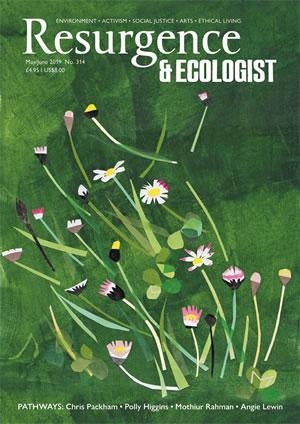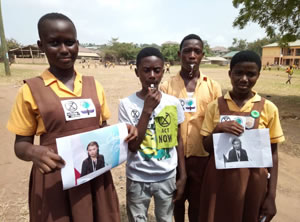Are humans destined to become extinct as a species? No one knows what will happen, and no one can say for sure whether fundamental ecological tipping points have already been reached. But there are millions of people mobilising to stop humanity falling off a cliff. And this movement is international.
There are new ideas that can help create kinder, regenerative societies, start the process of restoring Nature, and create communities of resistance and resilience to the impacts we cannot avoid. They want to do more than just avoid extinction or merely survive. They are building a movement on solidarity and wellbeing so that everyone, and every part of everyone, can flourish. Ending domination over Nature goes hand in hand with tackling all forms of domination and hierarchy: men over women, old over young, one ethnicity or religion over another, binary forms of sexuality – and of course minority world over majority world.
Extinction Rebellion has engaged more than a million people in 65 countries since its launch in the UK in October 2018, and by March 2019 it had 206 groups established in 24 countries. Its aim from the beginning has been to spark an international movement that will challenge governments around the world through the tools of mass civil disobedience.
Extinction Rebellion UK has started an international solidarity network to utilise its global reach to support existing resistance in the majority world, working closely with activists in West Papua, Bangladesh, Mongolia and the Caribbean. This support includes provision of media, funding for secure communications, and joint actions in the UK requested by majority world activists.
Ghanaian Extinction Rebellion activists held an event in February calling for action on the climate and ecological emergency in Africa, in solidarity with those in the global south – and the entire world. Mawuse Yao Agorkor is an activist with SMERJAPIC-WA, which stands for Stop the Maangamizi and Extinction Rebellion Joint Action Provisional Interconnections Council for West Africa – Extinction Rebellion in Ghana. (Maangamizi means the continuum of crimes of genocide and ecocide, in the Kiswahili African language.) He said: “The impact of the climate catastrophe is part of our daily life. This is why this event is important.”
The activists in Ghana have highlighted excessive plastic pollution in their seas, deforestation, and devastation caused by either flooding or drought. Wastewater containing toxic chemicals polluting their drinking water is also a key area of action.
The Phulbari Solidarity Group is a network of Bangladeshis who are campaigning against coal mining in their country, which is one of the most climate-vulnerable places in the world. Rumana Hashem, the group’s founder, has welcomed Extinction Rebellion’s work and said that ongoing civil disobedience to decarbonise lifestyles and to protect our planet from criminal extractive companies and governments was long overdue.
In December 2018 Extinction Rebellion supported a solidarity action led by Bangladeshi protesters and transnational campaigners against the development of coal mines in the Phulbari region of Bangladesh by the London-based company GCM Resources. Activists disrupted the company’s annual general meeting by occupying the front entrance of the venue for four hours, bringing their struggle to the attention of the major shareholders and GCM’s board members.
Extinction Rebellion is also linking to and learning from other movements. For example, it supported the Alliance of Small Island States (AOSIS) and the Climate Vulnerable Forum – together representing a billion people in more than 80 countries – in Katowice, Poland, during the COP24 climate conference. This included pulling together an international emergency coalition to reject weak language that would have condemned them to extinction.
The chair of AOSIS, Mohamed Nasheed, who is a former president of the Maldives and was its delegate to the conference, struck a defiant tone by stating clearly to the world, “we are not prepared to die … we are not going to become the first victims of the climate crisis. Instead we are going to do everything in our power to keep our head above water. We harbour no illusions about the dangers. And we are acutely aware of our own vulnerability. Climate change is a national security issue for us. It is an existential threat … we plan to survive in a warming world, any way we can.”
Support is also being provided, when requested, to the youth-led school strikes movement started by Greta Thunberg, and to the newly emerging Birthstrike movement that is taking off in many countries to support people who are choosing to not bring children into this world unless and until conditions improve. In the USA, the Sunrise Movement is building bipartisan support for a 10-year mobilisation/investment plan called the Green New Deal.
What all these movements have in common is a complete rejection of neoliberal economics and business-as-usual politics. We can and must redesign human societies based on love, justice and planetary boundaries, so that no person or society is left to face devastating consequences and we learn to restore Nature together. Faced with toxic systems that are destroying all life on Earth, affirmation of this vision and rebelling against whatever gets in its way becomes a sacred duty for all.
At this pivotal moment in history, it is important for all minority-world movements to use their platforms and resources to show solidarity with those on the frontlines. Activists in the majority world are paying a heavy price for defending Nature, with reports of between four and seven Nature defenders being murdered each week. It is vital to shine a light on the lived experience of climate and ecological breakdown, challenge neocolonialism in all its forms, and take action here in the minority world to confront the devastation caused by unaccountable extractive industries.
The rebellion has to be global to take on corrupt and powerful elites everywhere. We can and must succeed in catalysing a peaceful revolution to end the era of fossil fuels, Nature destruction and capitalism. Life on Earth literally depends on it. I hope you will join the rebels, wherever you are.








